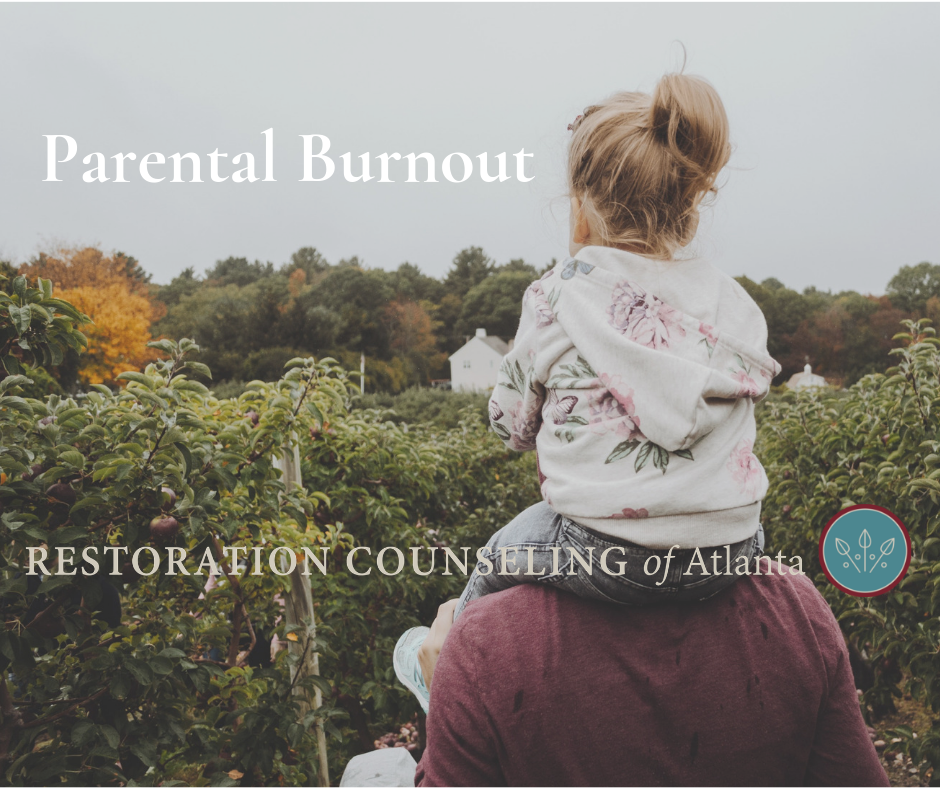All parents struggle at times with the demands on their time, attention, and energy. Jobs, relationships, housework, financial management, and keeping up with each child’s commitments can be overwhelming. Sports, dance, clubs, birthday parties, doctor’s appointments, therapy appointments, and schoolwork all pile onto the psyche of parents. This stress increases during the end-of-school months when course tests, recitals, and tournaments are added to the calendar. And don’t forget to plan the family vacations for the summer!
Most of the time, parents navigate these daily and seasonal stressors without becoming overly taxed (though there may be moments of losing it). These stressful times pass. For some, however, the burdens build up, become overwhelming, and lead to exhaustion that lasts much longer than a season. One study published in the journal Frontiers in Psychology found that close to 13% of the parents surveyed, 12.9% of mothers and 11.6% of fathers, had what the researchers called “high burnout.” They felt exhausted, less productive, less competent, and emotionally withdrawn — qualities that are similar to professional burnout — at least once a week.
What is Burnout?
Most of us have heard of burnout in terms of work. Burnout is a progressive state of emotional and mental exhaustion characterized by fatigue, irritability, and physical complaints that result from ongoing stress and the perceived inability to cope with the stressors. It could look like a coworker who is:
- short-tempered
- frustrated
- angry
- exhausted and/or apathetic
- showing reduced effectiveness or efficiency
- has a poor attitude
- exhibits low self-confidence
- using substances excessively or irresponsibly
- having sleep problems
- demonstrating little to no compassion for others
- avoiding others or withdrawing socially
- feeling incomplete or unlike themselves (aka “depersonalization”)
- has progressively lost their idealism, motivation, and goals
In other words, they have no patience for anyone and appear to be either going through the motions of work. They are looking for a fight with someone, on top of having personal problems.
What is parental burnout?
Parents are susceptible to a similar type of burnout, especially those who are overinvested in parenting their kids. While stress and exhaustion are inherent in normal parenting, parental burnout consists of three core points: exhaustion, inefficacy, and depersonalization. As in the workplace, overburdened parents get exhausted. They go from pinning DIY scented play dough recipes to just making sure the kids get a bath once a week. There is always much to do with children and often it is impossible to accomplish it all, much less to do it all well! Sometimes a parent will forego a lunch date with a friend or push their bedtime into the wee hours to check duties off their to-do list, causing further exhaustion. They may inflict inappropriate guilt upon themselves for not doing so, creating feelings of inadequate parenting.
Depersonalization
The depersonalization part of parental burnout is perhaps the most troubling. Depersonalization is the act of divesting someone or something of human characteristics or individuality. Parents can experience this in a couple of ways. The first is that they no longer know themselves because they have been consumed by the role of parent. They struggle to remember what they like and believe they have no identity outside of being a parent. The second way burned out parents may experience depersonalization is to stop seeing their children as individuals or even as human, which builds up resentment as parents experience more stress. Left unchecked, this could lead to emotional, verbal, or physical abuse toward the children.
More often, though, a parent copes by going into survival mode and emotionally distance themselves from their family, which leads to damaged or lost relationships with their spouse and/or kids. Parents who burnout carry extreme guilt about their anger, lost relationships, and ineffectiveness in parenting, which continues the cycle of depression, marital problems, and emotional distance from their kids.
What can we do about it?
The short answer: self-care! Create a balanced life and ask for support when needed, letting others help with the work.
- Remember that it is OK to not be a perfect parent- just be a “good enough” parent. It’s OK to be vulnerable and ask for help from those around you.
- Assign age-appropriate responsibilities to the kids. Don’t do it all yourself. Instead, set goals for them that will help them develop into responsible and confident adults.
- Improve your relationship with your kids. Learn to handle conflict in positive ways. Praise kids for doing something right instead of focusing only on avoiding negative behavior. That doesn’t mean not giving consequences for negative behavior, but when they make mistakes, teach them to make better choices instead of berating or criticizing them.
- Identify the positives of parenting and make these a part of your everyday experience. What parts of parenting bring you joy? Do more of that!
- Share affection and connection with your kids. Create down time where you are together and can talk about your feelings with each other. Focus on allowing THEM to voice their feelings, especially regarding stress. Try not to react to their feelings; just hear them and empathize with them. And don’t avoid or dismiss their feelings. Empathize and understand what your kids are going through. It’s not easy being a kid these days!
- Deal with your other life stressors. Take care of basic life necessities like shelter and food so you can focus on identifying other triggers for exhaustion and outbursts. Figure out if you are bringing job stress and burnout home and develop a solution
Self-care
You have a responsibility to take care of yourself in order to take care of others. Remember the oxygen mask analogy- you must put your mask on first before you can take care of those around you. Here are the main points:
- Take care of your physical health through nutrition, sleep, and exercise. Move! Breathe! Rest! All of these will release stress and help you avoid a host of mental disorders, including depression, anxiety, and burnout.
- Take care of your psychological and spiritual health. Get rest and relaxation. Get out into God’s creation. Create. Meditate. Be assertive to get your needs met and to set boundaries on your workload and with people. Maintain your self-esteem with a healthy and positive inner dialogue (a.k.a. don’t believe mean or untrue things about yourself). Have self-awareness and effective self-assessment, and/or loving, supportive people around you who will ensure you are loving yourself and growing where needed.
- If you don’t already have those loving, supportive people around you, go develop a social circle. You cannot do life alone, whether you’re a parent or not, so go find people you trust to help you when you need it. Get involved in something so you belong to a group. It could be at your church or your neighborhood; join a gym; take up a hobby, etc. Find a way to connect with people.
Are you burned out? Take a quiz!
Take the following quiz to find out if you need to implement some self-care to reduce your stress levels to be more present with your family and a better parent overall.
http://momswellbeing.com/burn-out-mom-dad-quiz/
 Written by: Paige Santmyer, APC
Written by: Paige Santmyer, APC
Roswell location
paige@restorationcounselingatl.com, ext. 157
Paige is committed to providing a safe and comfortable atmosphere, where clients can explore the challenges they are facing. She also believes in addressing the individual’s entire personhood, assessing needs in all domains of life instead of focusing solely on mental health needs. Paige works with adults and teens around issues of depression, anxiety, mood disorders, relationship issues, trauma, PTSD, and life transitions.
References
Hubert, S., & Aujoulat, I. (2018). Parental Burnout: When Exhausted Mothers Open Up. Frontiers in Psychology, 9, 1021. doi:10.3389/fpsyg.2018.01021
Mendez, Edgar. (2019, Feb 21). Parental burnout is a real thing, but you’re not alone. Here’s what you can do about it [web blog]. Journal Sentinel. Retrieved from: https://www.jsonline.com/story/news/solutions/2019/02/21/parental-burnout-hurts-parents-children-what-you-can-do/2916674002/
Mom’s WellBeing blog. (n.d.). Are You a Burned Out Mom? Are You a Burned Out Dad? [web blog]. Retrieved from: http://momswellbeing.com/burn-out-mom-dad-quiz/
Wallace, Kelly. (2017, May 9). Parental burnout: It’s really a thing [web blog]. CNN.com Retrieved from: https://www.cnn.com/2017/05/09/health/parenting-burnout-professional-burnout/index.html

